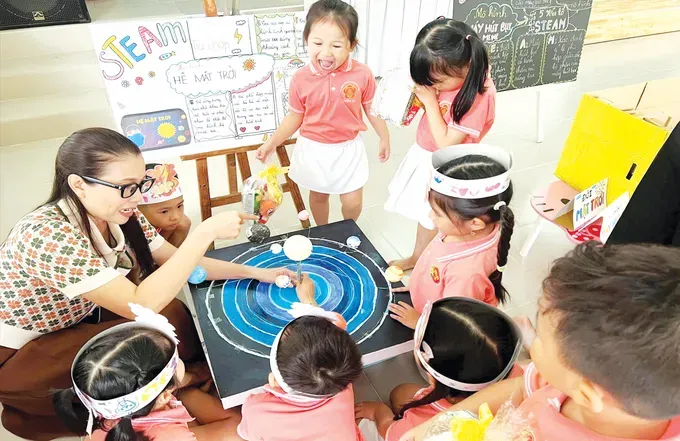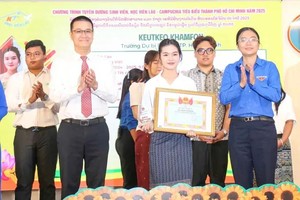
Previously, STEM teaching activities had already been actively developed at the primary, lower secondary, and upper secondary levels in Ho Chi Minh City.
According to Head Luong Thi Hong Diep of the Preschool Education Division of the Ho Chi Minh City Department of Education and Training, the city has developed a shared digital resource library to support preschool teachers in innovating teaching content and methodologies.
In the 2024–2025 academic year, the Department organized its first Preschool Education Networking Festival, designed to facilitate experience-sharing in STEM education (integrating Science, Technology, Engineering, and Mathematics) and to enhance digital transformation in teaching innovation.
At the same time, schools have actively mobilized social resources, encouraging parental participation in organizing educational activities for children. This has helped establish a consistent and sustainable source of support, thereby contributing to improved educational quality.
A representative of the Department emphasized that STEM education is among the key solutions for effectively implementing the new preschool curriculum. Within the context of comprehensive educational reform, shifting teaching methods toward play-based learning enables children to develop critical thinking, independence, creativity, and the ability to apply knowledge to real-life problem solving—laying a stronger foundation for progression to higher levels of education.
However, challenges remain, including disparities in facilities among schools, inconsistent understanding of STEM education among administrators and teachers, and the absence of model frameworks across educational institutions.
To ensure systematic and effective implementation, the education sector has proposed that the Ho Chi Minh City People’s Committee provide financial support, while also carrying out a set of comprehensive measures. These include developing competency standards for STEM education in teacher training institutions; designing training programs with specialized professional development modules for teachers; and strengthening collaboration among teacher training colleges, preschools, and enterprises to support both teaching and practical training for educators and students.
Schools in Ho Chi Minh City integrate STEM and AI Education
According to the Ho Chi Minh City Department of Education and Training, all schools will implement educational plans for the 2024-2025 school year that integrate STEM education through various methods, including STEM lessons, experiential activities, and scientific research.
In addition, many schools are actively enhancing the quality of their clubs and academic teams to support scientific research activities. They are also piloting the integration of artificial intelligence (AI) education into the general curriculum.
For the 2025-2026 school year, as the entire education sector promotes two-session teaching days for middle and high schools, Ho Chi Minh City will continue to review and implement key projects and programs. These include the 'Bringing Artificial Intelligence to Schools' project, the 'digital education' program, and the deployment of a Digital Competency Framework for teachers and students, as well as the Digital School Model.
Primary, secondary, and high schools will deploy the digital competency framework for students. This framework will be integrated into a wide range of subjects, educational activities, learning projects, scientific research, and clubs to synthesize resources and promote STEM and digital education within schools.
Principal Le Thanh Huong of Tran Hung Dao Primary School noted that to meet the diverse needs of students, schools must offer a variety of programs. Her school, for example, organizes its club system in two forms such as free and fee-based. The free clubs are designed for students from disadvantaged backgrounds and gifted students, ensuring educational equity and nurturing their talents without financial barriers.
The fee-based clubs are organized based on the needs and aspirations of learners, promoting the social investment in education and meeting the diverse, specialized, and personalized learning needs of each student. This tiered approach ensures that no student is left behind, providing opportunities for all to participate in educational activities.
Recently, the Department of Education and Training of Ho Chi Minh City has assessed and approved the English-Vietnamese bilingual STEM program to be implemented in primary, secondary and high schools in the 2025-2026 school year.
For the first time, the city will apply information technology, deeply integrate artificial intelligence into teaching and learning English, gradually making English the second language in schools.
This is one of the solutions to implement Conclusion 91-KL/TW (dated August 12, 2024) of the Politburo and Decision 1600/QD-TTg (dated December 19, 2024) of the Prime Minister on building a comprehensive English learning environment, encouraging students to use English as an effective communication and learning tool.
























